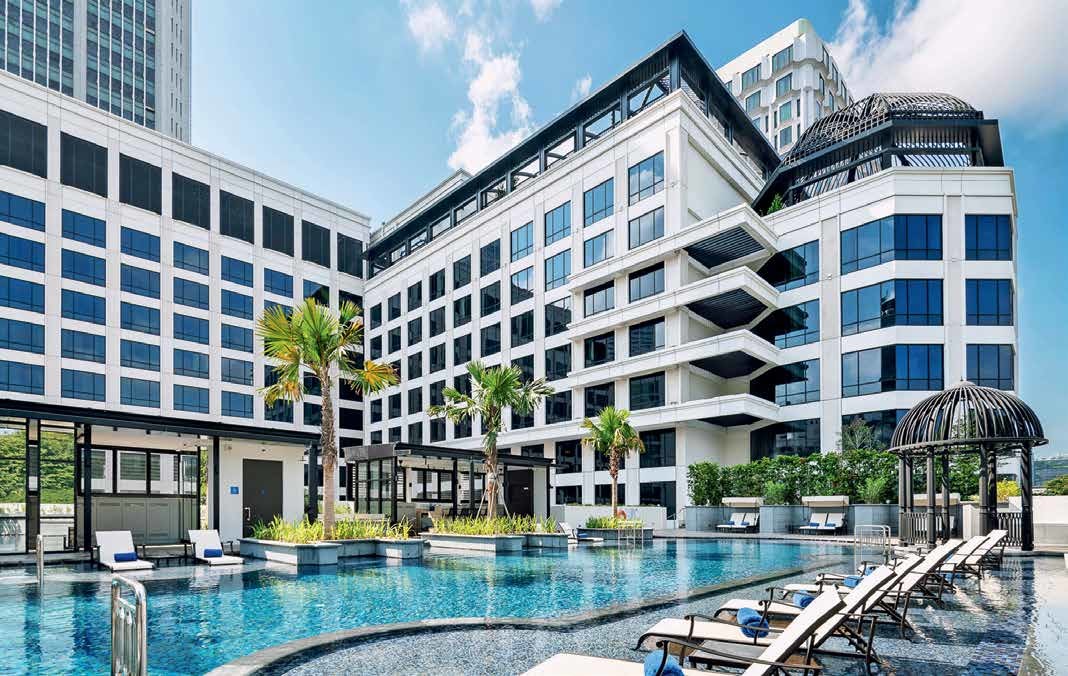The way to the modern traveller’s heart is to combine thoughtful destination-centred design with cutting-edge technology.


The way to the modern traveller’s heart is to combine thoughtful destination-centred design with cutting-edge technology.
The hotel group ventured into the Maldives two years ago with the launch of Grand Park Kodhipparu.
If one wants to understand what the Park Hotel Group holds close to its heart, one needs only to step inside its newly renovated flagship hotel, Grand Park City Hall. This gleaming property is one of almost 20 hotels and resorts owned or managed by the Singapore-based hospitality company, which has operations in 12 key destinations across the Asia-Pacific. The latest to have opened include Park Hotel Yeongdeungpo in Seoul and Grand Park Kodhipparu in the Maldives.
In Singapore, Grand Park City Hall was relaunched late last year in the Civic Distric after a two-year renovation. The hotel was previously in operation for about a decade and, by the time the project was complete, it had undergone a total transformation. “The wanderlust quotient is high among consumers today. Whether people are travelling for business or leisure, modern travellers want to make the best of their trip and enjoy a rich experience when they arrive,” says Allen Law, CEO of the Park Hotel Group. “So, when we embarked on the masterplan to renovate the Grand Park City Hall, we made sure that the new hotel would give our guests a sense of place.”

After two years of renovations, Grand Park City Hall was transformed into a modern luxury hotel with an emphasis on local flavour.
Today, the new Grand Park City Hall is the perfect encapsulation of a luxurious modern hotel with a distinct local flavour. With some of the city’s most historic and architecturally interesting buildings as neighbours, and its proximity to theatres, galleries, shops and nightlife destinations, guests here have the best of both worlds – the old and the new. Inside the hotel, this balance between traditional and contemporary is also reflected in the decor, which is neoclassical meets sophisticated. Elements that tell the story of Singapore, both past and present, are interspersed throughout – from the prettily patterned Peranakan tiles paving the entrance to each guest room, and the photography reflecting local motifs hanging over each bed, to the vintage statement artworks that provide visual interest in the communal spaces. The hotel also has a new bronze arch at its entrance, serving to frame the colonial-style facade and also to beckon visitors.
For discerning guests, it’s precisely these thoughtful little touches that make each moment spent at a property run by the Park Hotel Group so special, no matter whether it’s a Grand Park, Park Hotel, or Destination brand. “As a company, we are guided by our passion to deliver authentic service from the heart, so our guests can experience exceptional, culturally rooted, and globally inspired hospitality when they stay at our properties,” says Law.
GRAND PARK CIT Y HALL IS THE FIRST HOTEL IN SINGAPORE TO LAUNCH FACIAL RECOGNITION TECHNOLOGY F OR CHECK-IN ON MOBILE.

Heritage touches come to the fore through photography – for instance, shots of local shophouses – and materials, such as the use of Peranakan tiles.
The other thing that guests will instantly recognise as a remarkable characteristic of the Park Hotel Group is its commitment to using technology to give guests greater convenience. Grand Park City Hall, for example, partnered Singapore Tourism Board to pilot a mobile application, making it the first hotel in Singapore to launch facial recognition technology for check-in on mobile, and creating a seamless experience from pre-arrival through to checkout.
Whether the preference is for a garden view or a room near the elevator, guests can select their rooms up to 48 hours before arriving at the hotel. They can also complete the pre-arrival registration in advance, and simply snap a selfie and verify their identities through the tap of a button to skip the formalities at the front desk. A digital room key will be issued on the guests’ mobile phones, so they can go straight to their rooms. It is estimated that this mobile app can reduce the average check-in time from five minutes to one.

Family rooms are specially designed to pique children’s interest
Once guests are ensconced in the comfort of their rooms, they can use the smartphone app to control everything from the lighting to the room temperature, and even the television channels. The concierge can also be contacted directly via in-app messaging – common requests for things such as bottled water or extra towels are just a few taps away. However, the front desk is still in operation; guests who wish to register their arrival the old-fashioned way can still do so. And, if they do not wish to download the app, they can borrow a mobile device that already contains the system. Physical key cards are also available to those who request it.
On a global scale, the Park Hotel Group has adopted a chatbot called Carrie on its website and Facebook page. Recognising that customers expect businesses to respond quickly and provide prompt service, the group entrusts Carrie with the task of fielding queries that can be easily answered, such as questions relating to check-in time. However, Carrie can also facilitate communication with a member of staff, should guests prefer to engage with a real person – because sometimes there is just no substitute for human interaction.
“Travellers are now more savvy, more connected, more empowered, and possibly more distracted by the wealth of knowledge and opinions that are available out there,” concludes Law. “Therefore, it is important that we anticipate their needs and wants by curating the perfect match, with regard to products, service and experiences.”























